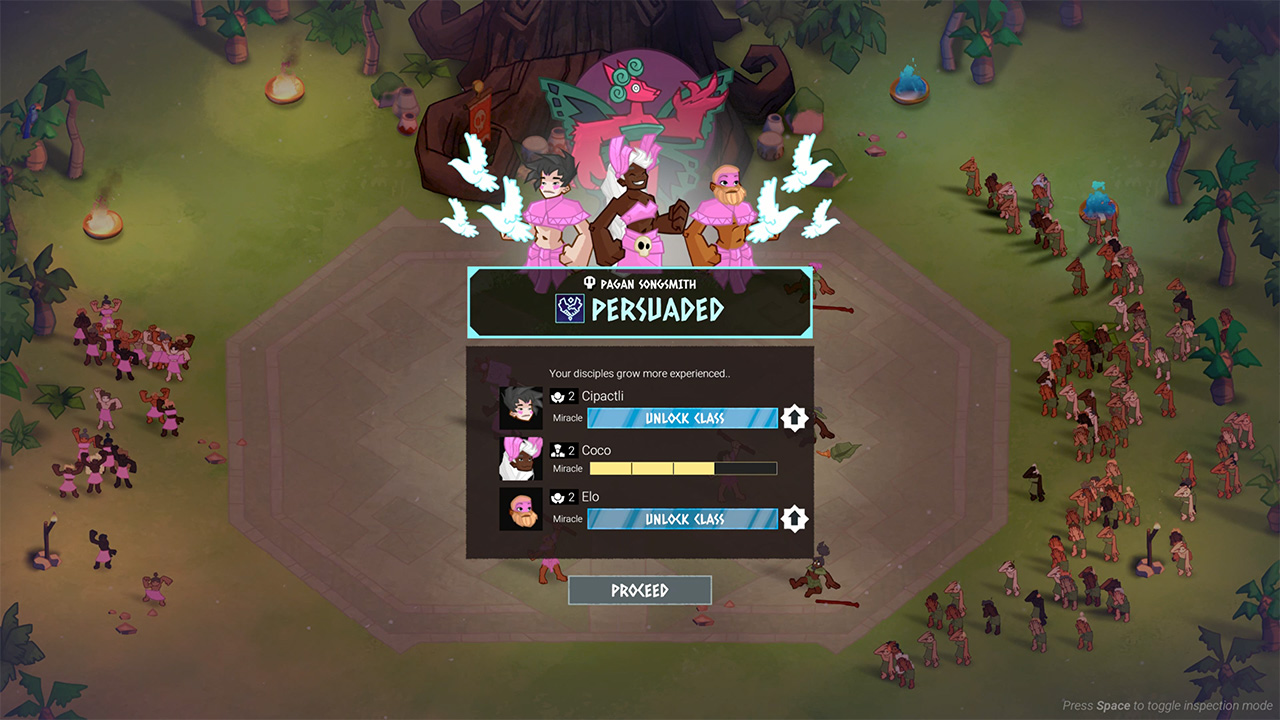Godhood – Does it still count as worshipping a false idol if I’m the idol?
Type: Single-player
Genre: Simulation, Strategy,
RPG, God-Game
Developer: Abbey Games
Publisher: Abbey Games
Release date: 10 July, 2019


Misrepresented as an indirect god-game, the Early Access release of Godhood breaks neither bread nor new ground, and is instead a cute, if repetitive, mini-RPG battle sim skinned with theological window dressing. Instead of splitting skulls, you yell “I can smell your impurity” and thump your bible to stun enemies. Instead of exploiting the resources of an untamed land, you order your disciples to herd your spiritual and literal flock. Instead of wandering the wilderness in search of a promised land for your people, you click idly through a few hexes on a map to plot your linear path forward. A god game with very little godliness, Godhood does at least have a great art style, fun mechanics, is easy to pick up, and offers very low-stress gameplay while still having a few moments of religious intrigue.
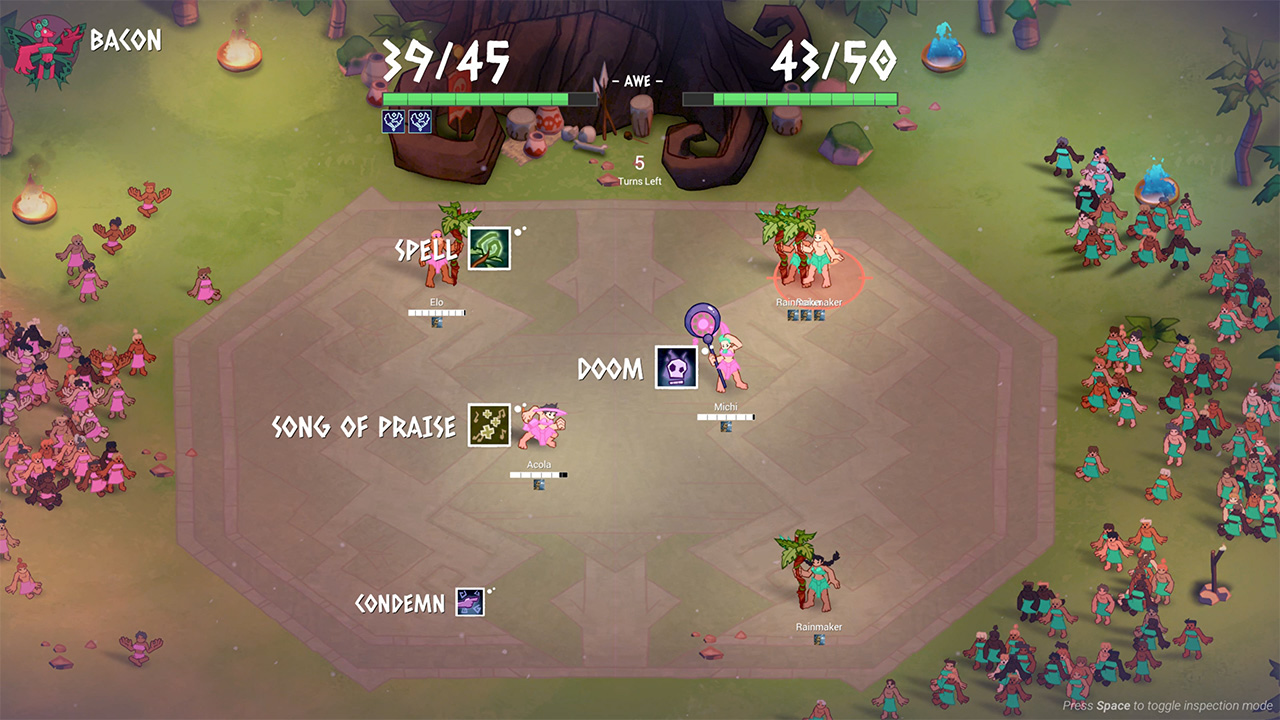
The Sacred and the Profane
The main activity of Godhood is to gain and maintain followers by building and expanding several types of holy sites around your home village. You can anoint the chosen few to be your disciples, and send them to worship or perform miracles in order to build up their stats. For example, the storytelling ritual will increase Charisma, while dancing around a fire will give them a Faith bonus. The more faithful your followers, the more manna you have to work with, which can be spent on expanding your village or as the cost of performing rituals. Fulfill your religion’s manifest destiny by sending out your best spiritual warriors to engage in divine combat to win the hearts, souls, and land of your competing neighbors.
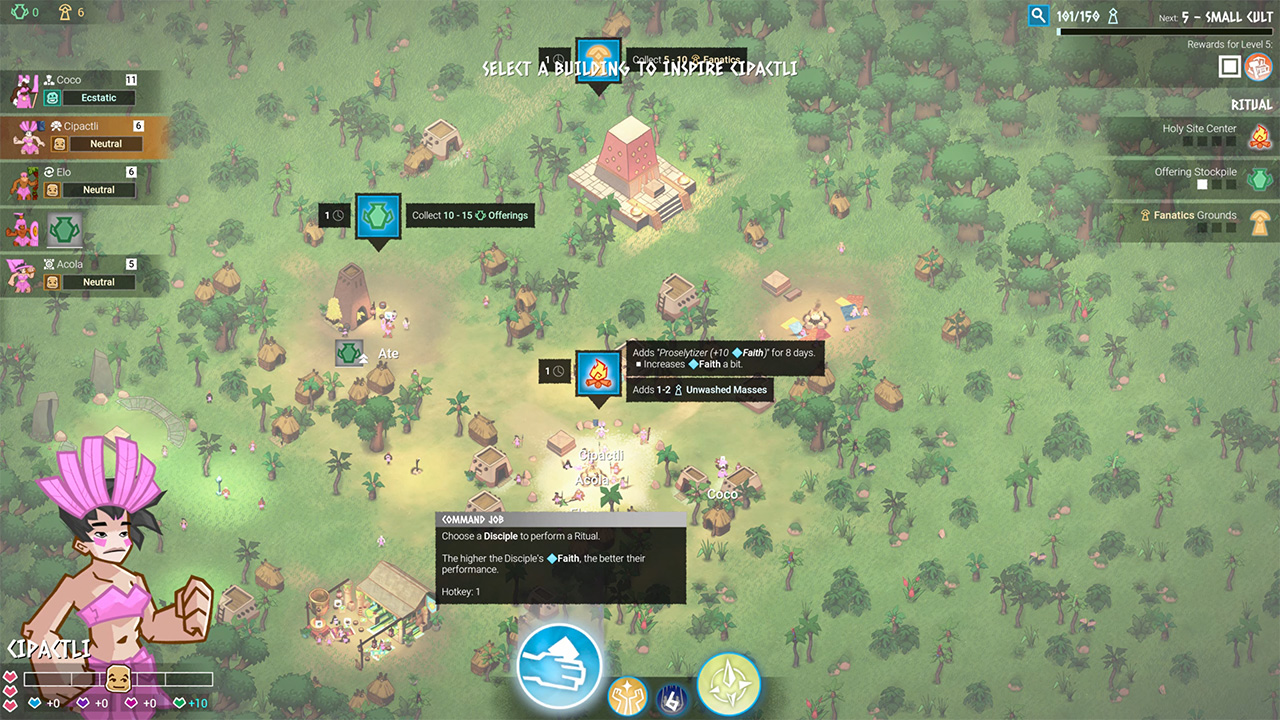
Spiritual combat, although very heavy in the RNG department, can be fun, even though interaction is severely limited. Mostly it resembles turn-based combat from other RPG’s, only swapping attacks and magic for moves such as “Convert” and “Condemn”. Battles are always three on three, which is a bit uninspired, but at least you can mix things up by juggling the multiple character classes, such as Rage Prophet, Zealot, and Ascetic, each having different strengths and weaknesses. The only real interaction you get regarding combat is to choose which of your disciples to send into battle based on their respective stats. In this way you can try to overcome a much stronger opponent by preying on their weaknesses and maximizing your party’s unity.
Otherwise, actual combat is a hands-off affair, and instead unfolds like a miniature miracle play before you, with your followers smiting all that can be smitten, or withering in defeat like the pagans they are. The characters act out each attack in turn, react to each incoming hit, and choose their own moves automatically, all without any interaction from you. Occasionally one attack will trigger an automatic reaction from an opponent, which in itself may trigger another automatic response from your team, and so on, all of which can create a fun back-and-forth flurry in the middle of an otherwise metered battle.
Despite juggling a multitude of variables (which can be examined during combat by entering “Inspection” mode), fighting is ultimately a roll of the digital dice. Many times I’ve overcome ridiculous odds by sheer chance, and other times had a sure victory lost by bad luck. Some may complain, but I never minded this approach, as there are no real repercussions for losing (aside from having to wait a turn or two for your characters to heal), so it’s fun to experiment with different load outs; in effect the game encourages you to take on more than you can handle and not have to pay penance later.
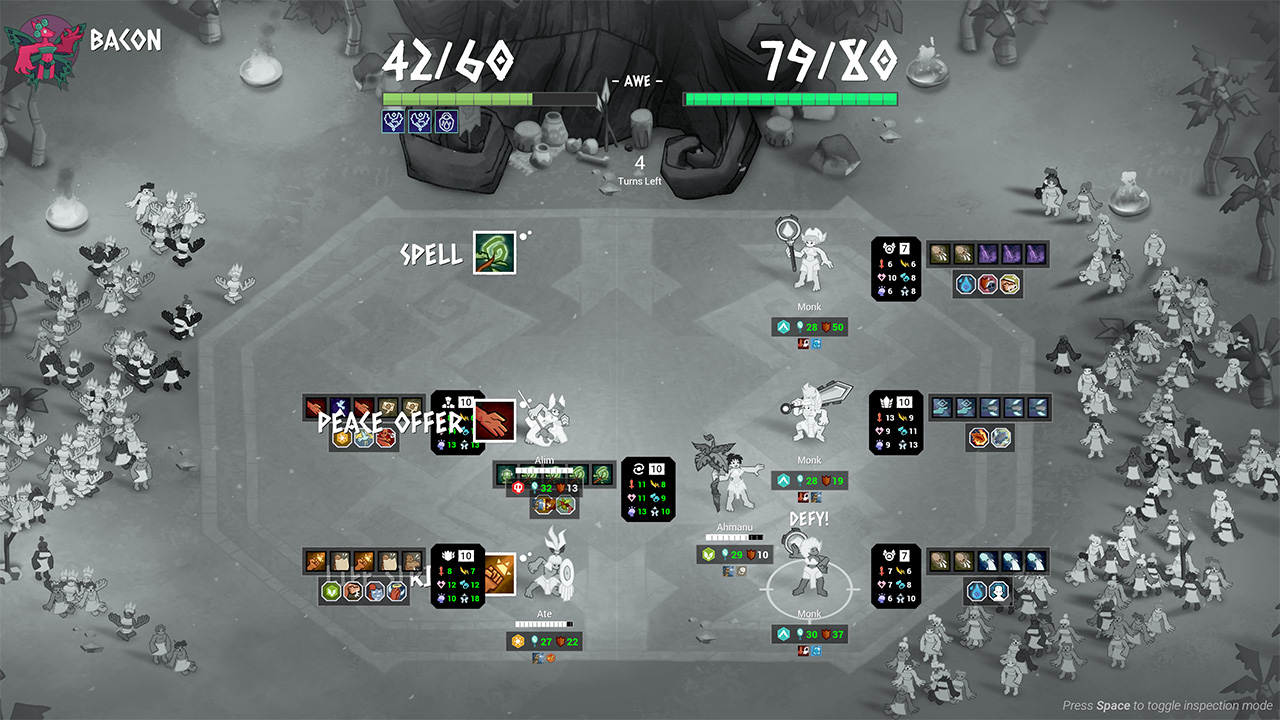
Each win converts the citizens of that village to your religion, unlocking new destinations on the map, and new foes to battle. Progress continues steadily in this vein until you max out your religion’s followers, after which the game ends, simply and unceremoniously. At present there are no other goals or victory conditions (that I’m aware of at time of this review), however that may change for the final release.
Doubting Thomas
But how, in the name of yourself, does anything in Godhood involve actual godhood-ing? True, you pick followers, you order them to pray at this temple or that shrine, you send them into battle and every once in a while a character or a building gets an upgrade, but essentially is that all there is to being a god? No resources to manage, no control over the fate of your followers, no growth for your believers other than in quantity, no reason to tend to your flocks, and no punishment for leading them astray, and the whole “belief” system is nothing more than a shallow set of stat modifiers. So what’s left? Just combatified proselytizing on a hex map.
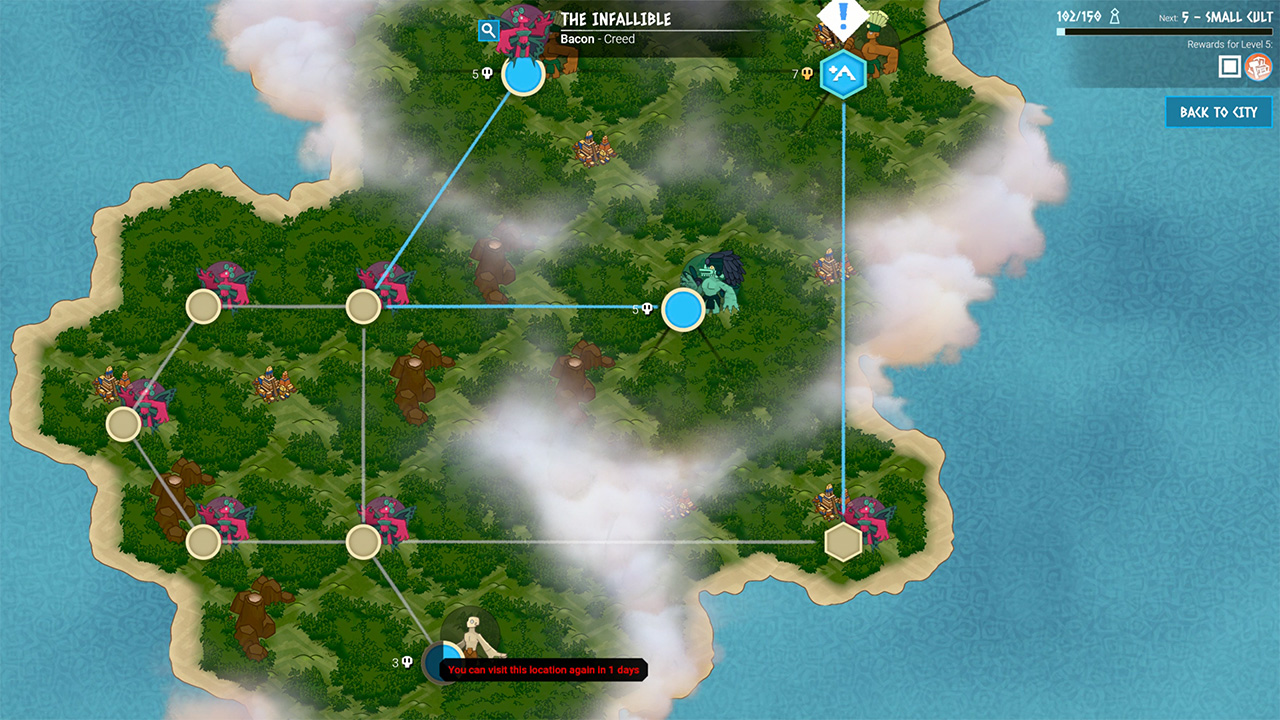
The game bills itself as being an “indirect god game,” but maybe it’s concept of “indirectness” is flawed as well. The parts of the game that you’d rather have control over (like combat) are overly indirect, whereas other tasks that would ideally be automated (like the incredibly repetitive act of collecting offerings) tediously insists on your direct input. So, in other words, the game is indeed indirect, but it’s taking all the fun parts out of your control and what’s left feels like deified busy-work. The day-to-day management tasks are repetitive and unrewarding; I’m a god, shouldn’t I be doing something more omnipotent than ordering acolytes to herd the flock?
Combat, by contrast, is indirect to a fault. If, like me, you harbored dreams of controlling nuns duking it out with brass knuckles, then sadly you will greatly disappointed. Once you choose your three combatants for a battle (called a “Sacrament” in Godhood) and click the “Start” button, the rest is on auto-pilot, there is zero interaction during combat. This is not only disappointing from a gameplay perspective, but it’s surprising given the almighty theme. If I’m a god, why can’t I assert my ineffable power on the battlefield? Is it too much to ask for the ability to occasionally perform a minor miracle and reward the faith of my combatants with a simple deus ex machina, or divine intervention, or holy intercession, or even a humble holy hand grenade?
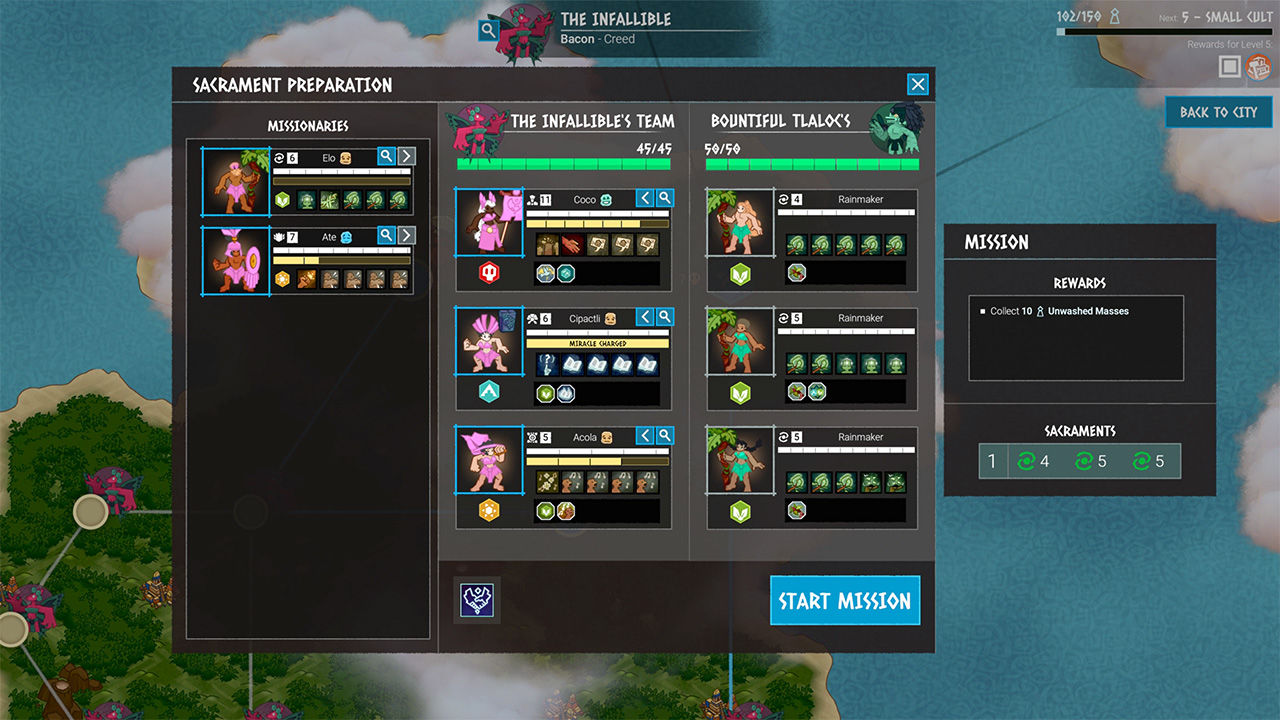
As you trundle through the sparse map, it often feels more like moving through a tournament bracket, rather than traversing a living and breathing world; the village, islands, and ruins are nothing more than geographic wallpaper, a visual excuse to move through the rankings as you fight tougher and tougher foes. This is fine by itself, but feels like a disconnect with the other aspects of the game, and makes the world feel like a static board game map totally oblivious to the divine struggle between good and evil that is unfolding across its flattened surface.
And the only active part of fighting, building up your roster of fighters, is heretically hobbled. You have limited slots to assign acolytes to, leveling up characters is a slow process, and swapping out aging characters for new recruits happens too infrequently, which means that most of the time you’re stuck with an imbalance of young but untrained along-side experienced but geriatric combatants. I would rather the game choose one: either focus on building up each character individually over time with deep development, or focus on the rapid turn-over of multiple characters to favor speed and flexibility; but Godhood can’t decide which to path to follow, and trying to do both proves too heavy a cross to bear.
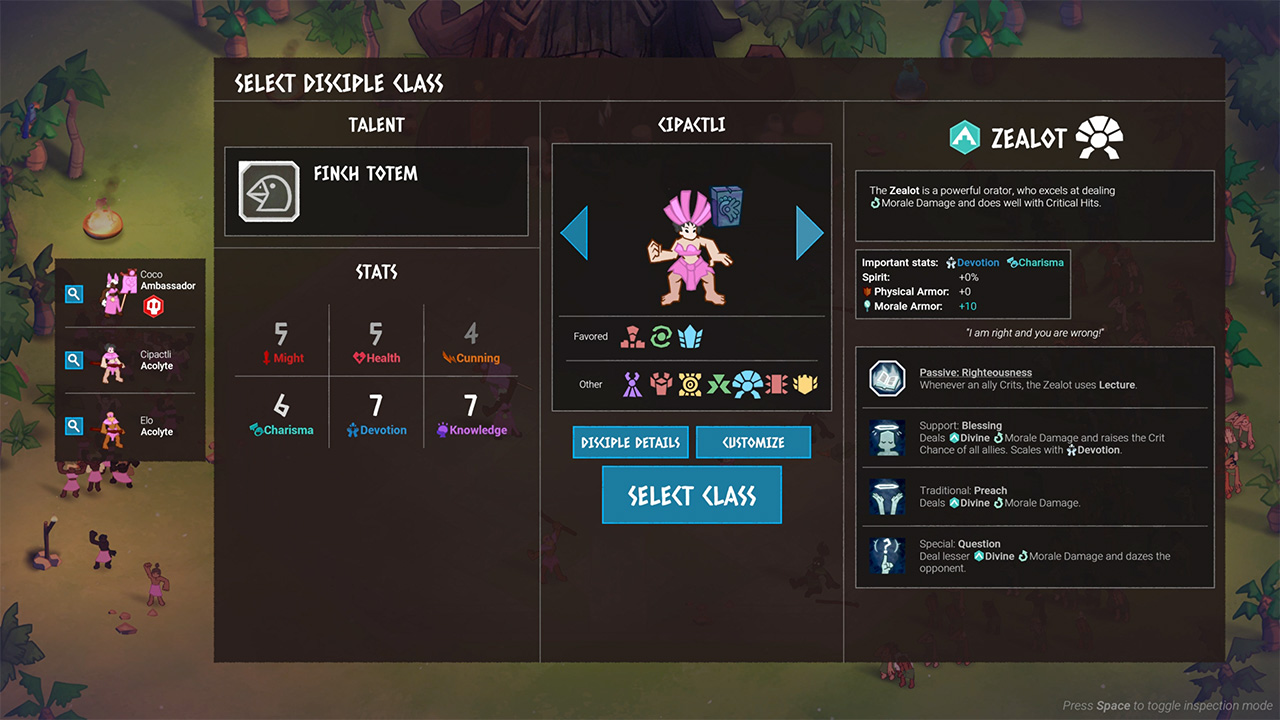
Considering the current cost of the game, there is a woeful amount of content. Not only is the game very short (under 10 hours, if you’re lucky), but what is there grows undeniably repetitive about halfway through your playtime. Once you get the hang of the various buildings, stats, and upgrades, nothing new is added to the game mechanics to shake-up the routine, and there are no larger goals to work toward, or challenge yourself against. Once you’ve been through the main campaign, there’s very little reason to return and try again.
Granted, there are different approaches you can take, but not enough to dramatically change a playthrough. For example, the game claims to have a morality system with which you can direct your followers; in reality it’s just choosing at the beginning of the game if you want to essentially be good or evil (follow a path of chastity and peace, or war and lust). These affect your stats, but do not change how the game is played in any dramatic way, and isn’t necessarily a reoccurring mechanic in itself.
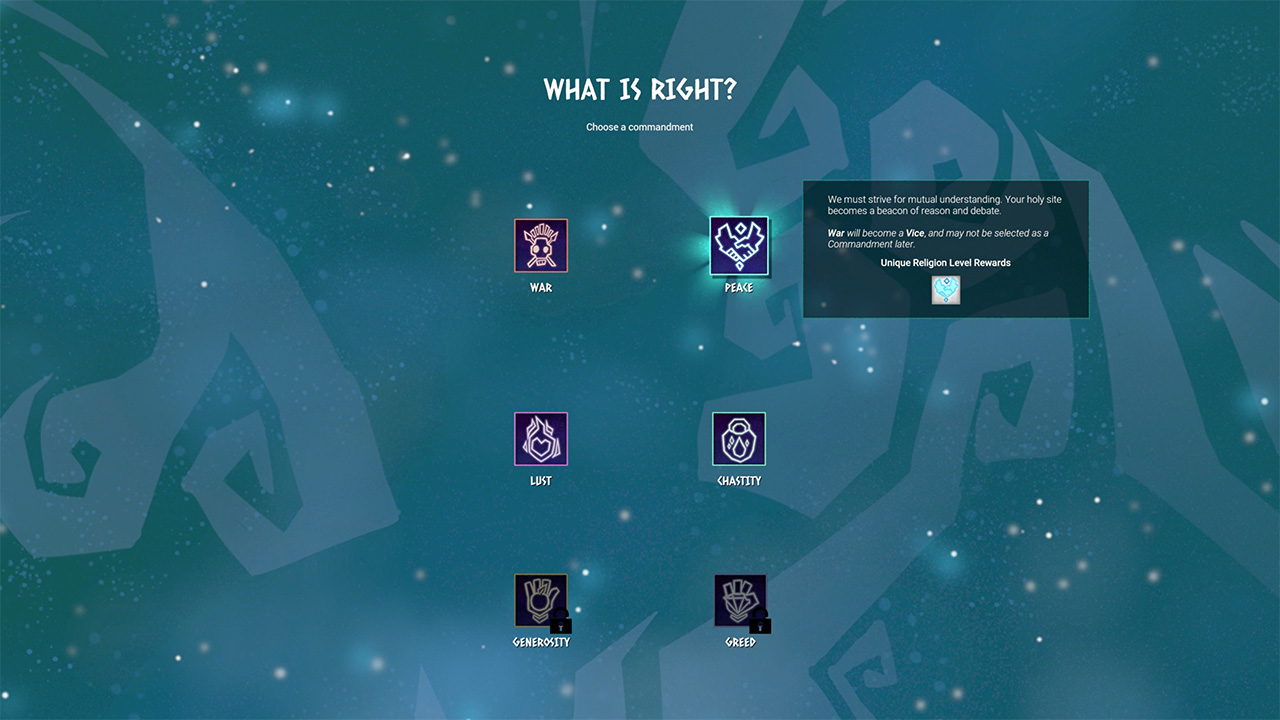
Thematically, given that the subject of religion is fertile ground, it’s surprising how little Godhood explores it. The game is not witty enough to be a parody, it isn’t critical enough to be satire, and is not imaginative enough to be surreal; instead it aims to be offensive to none, and hug-able by all. Though I cannot fault these goals, it does make the game a tad forgettable after the experience of playing it has come to an end (except the hugs, of course, those are for life).
Vision Quest
The overall look and feel of the game is really well designed, while still being playful and accessible. The interface is simple, easy to use and unobtrusive; I did encounter a few minor UI glitches, but those are easy to overlook and I imagine will be fixed before leaving Early Access.
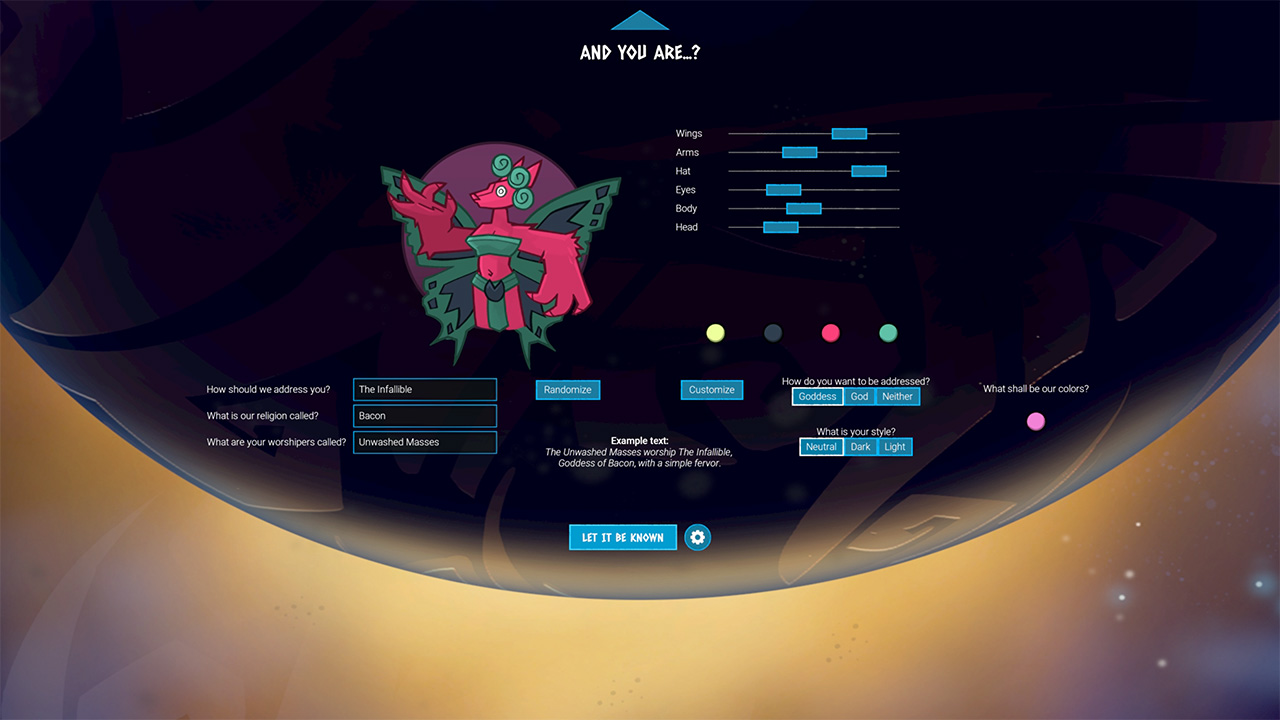
The game’s obsession with randomness extends to its character designs as well, but in this case that’s a good thing. The look of the characters is super cute, but what’s more interesting is that they are randomly generated. Eyes, face, body style, color scheme, and personal traits are all randomly generated in a mix-and-match graphical free-for-all. The results, though wildly random, are terribly endearing, and usually involve women with facial hair and guys in halter tops; which is all fine, I’m a firm believer that sideburns should be unisex.
The animations are really nice too, but I do wish there was more variety. For the characters there are no special moves, or killer combos, or victory dances; visually each battle feels like the previous battle, just with a slightly different color palette. The backgrounds are also surprisingly static, with a few scattered fire pits being the only source of life among the set dressing.
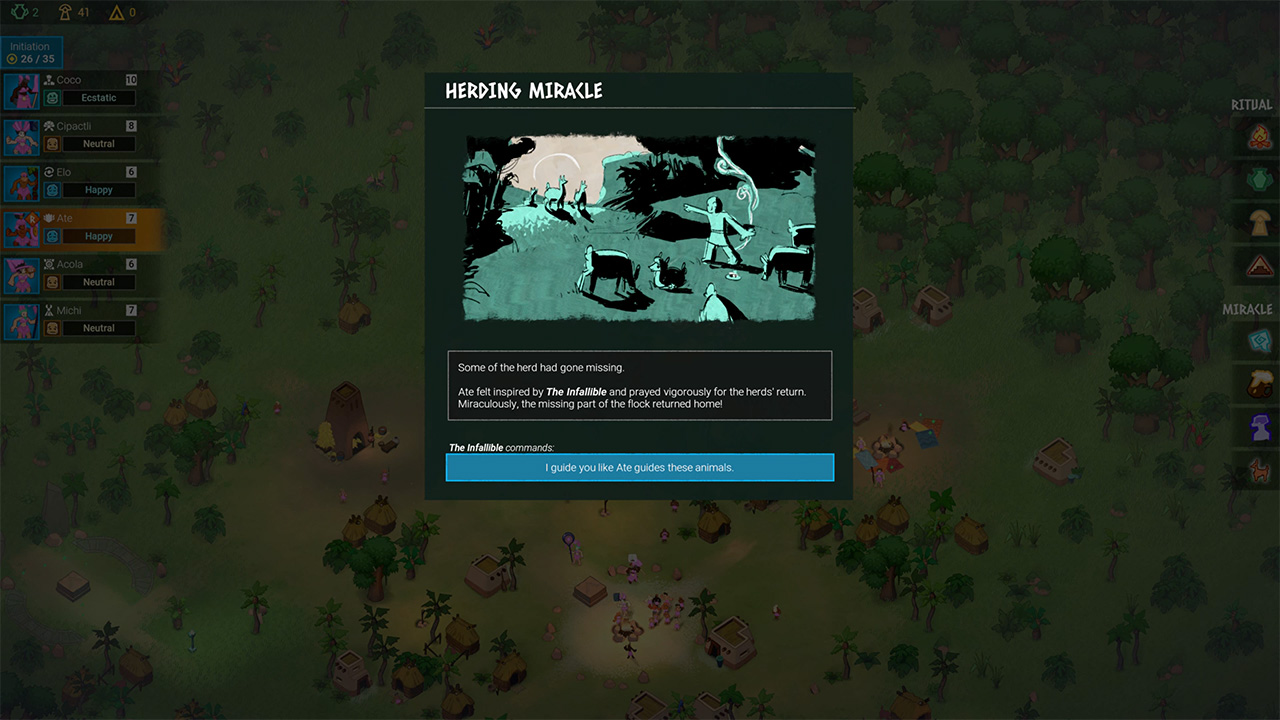
However, I was quite tickled with the clouds in Godhood. This might be a silly detail to glorify, but banks of cartoony clouds act as a fog-of-war over the map, and as you drag your cursor across them, the little fluffy clouds will part and flutter about, as if the very hand of god is moving through the sky. It’s a tiny detail, but adds a lot of personality to the visual flair which the game already has in abundance.
The music and sound effects match the visuals perfectly, and accent the game without overpowering it. It’s relaxing when it needs to be, and rousing at all the right moments.
Leap of Faith
And for all its sins, at least Godhood has beer; drinking is (and rightly should be) a big part of many religions, and in Godhood it is a downright necessity. Sending your faithful on a holy binge regularly helps to keep the health of your disciples up, through a divine act known as the “Heavyweight Drinker Miracle”.
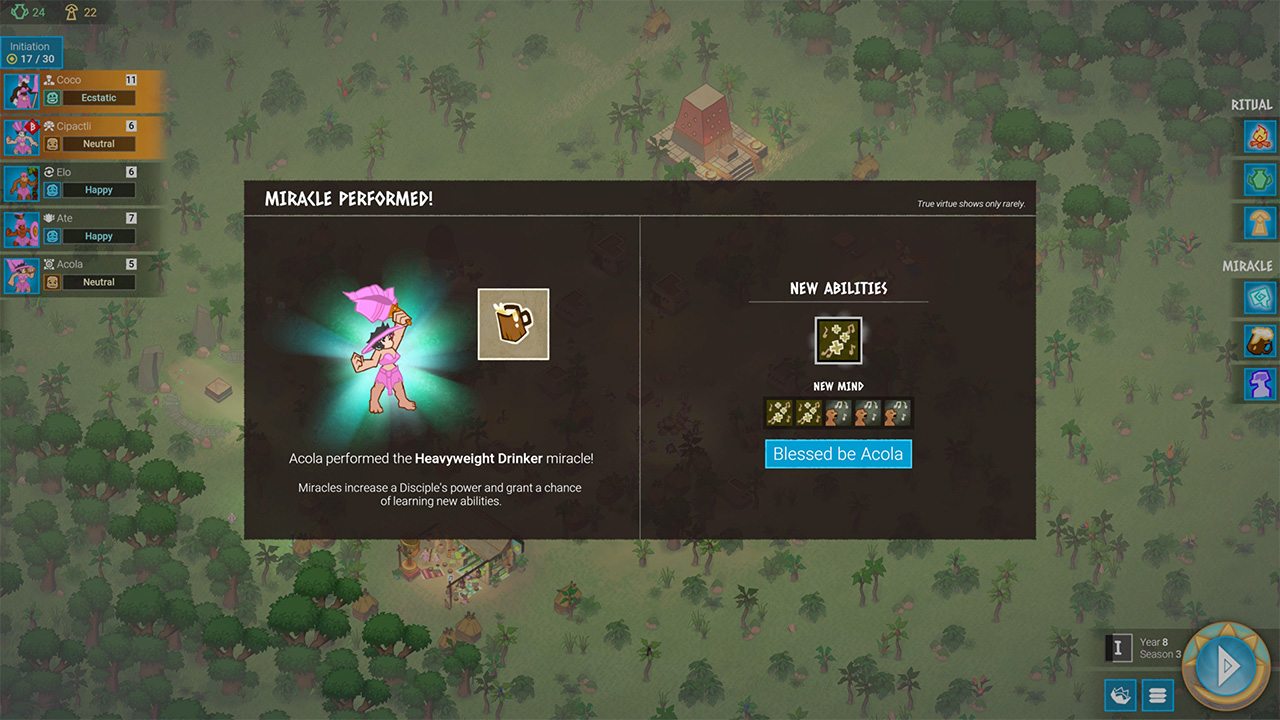
Despite all the other nitpicking, it’s not to say that the game isn’t fun; it is fun, for what it is, during most of its very short duration. If you view it as a relaxing and lighthearted mini-RPG, you’ll probably enjoy Godhood‘s unique blend of management, sim, strategy and turn-based auto-combat.
The game is still in Early Access, and Abbey Games seems active in its continued development, so it’s safe assume that more content will be added; no doubt more items and upgrades will be included, new options and play-styles will be implemented, combat will be tweaked and balanced. So, for what the game is, even though it’s currently flawed, it does show promise as it continues to evolve. As for what the game is not, well, it really isn’t a god-game, so it’s best just to accept that fact, and judge the game on its own terms.
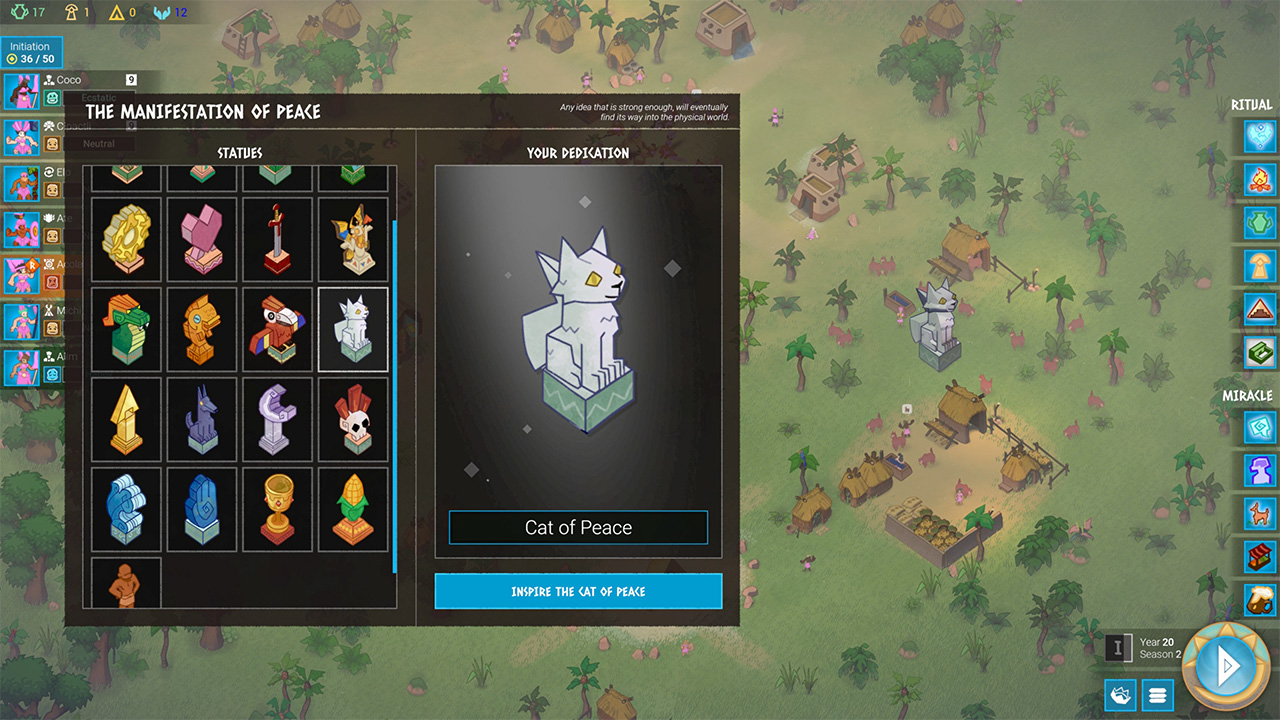
Verdict
All in all there are some mixed blessings in Godhood. I like the battle system, even though I do sorely wish there was more to do during combat than just watching it unfold passively. The characters and character building have potential, even though currently this system is under-utilized. And despite it falling far outside of the god-game genre, it does well in forging its own style, which offers a few unique surprises along the way. The game is still in Early Access, so there are many things that may grow and change before the final release.
Ultimately Godhood doesn’t take itself any more seriously than it absolutely has to, which is maybe sound theological advice, and the result is a light-hearted, albeit simple, little RPG battle sim. It’s a nice game for those rainy afternoons filled with spiritual self-doubt, or as something to play while you’re streaming “Good Omens” in the background. Either way, the Early Access release of Godhood represents a good start, just don’t expect any miracles.
